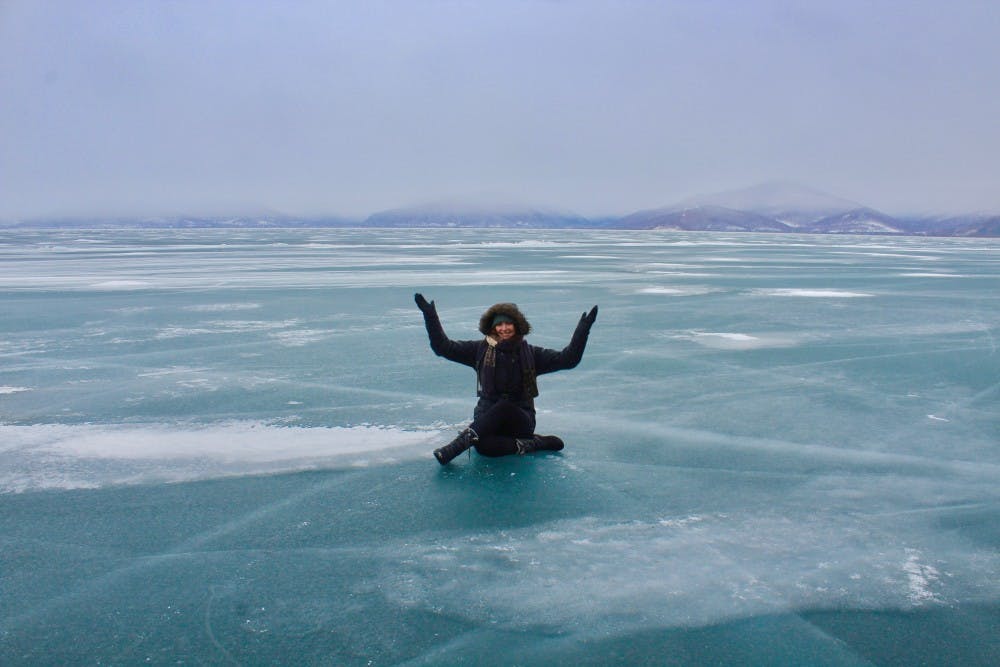The low temperatures of the polar vortex did not faze senior Rylin McGee, who studied abroad in Siberia, Russia, where she endured temperatures as low as negative 30 during her daily commute to class.
McGee is one of several students who decided to pursue non-traditional study abroad destinations.
“The traditional [study abroad] is really defined as the numbers of students going to particular locations,” Michele Cox, director of study abroad, said. “The top destinations are the UK, Spain, Italy, France, and Australia has become a more common destination as well.”
Cox added that traditional programs are often held in countries that are predominantly English speaking, or that speak languages that students typically learn in high school.
McGee, who is pursuing a double major in international studies development and change and Russian studies, said Siberia was the perfect place to study both of her academic disciplines. McGee was most interested in studying Lake Baikal, the deepest freshwater lake in the world, and the pulp and paper mill that was found to be polluting the lake.
“It has so many endemic species that you can only find there, and so that was something that I really wanted to see and study,” McGee said.
McGee studied how industrialization can impact the environment and how communities can act to stop these environmental determinants.
Living conditions where she was studying at Irkutsk State University, in Irkutsk, Siberia, were nothing like those at Richmond, McGee said. Her daily commute to school would take about two hours, she said. Because public transportation in Irkutsk was so bad, McGee would ride in a marshrutka, or utility van, that was often driven by illegal immigrants. These vans had their windows covered so onlookers could not see who was driving, and the vans were packed with people, McGee said.
“You’re like a sardine in a can trying to jump out at your stop,” McGee said. “You have to yell like ‘na ostanovkye, pozhaluysta,' which means 'on the stop please,' please stop, and then get out. It was wild.”
Other daily activities also posed problems for McGee.
“The conditions weren’t the best,” McGee said. “So, for example, the water. You’d filter and boil it, and I’d still get sick from trying to drink it.”
McGee, who is a vegetarian, said she had had a hard time finding green vegetables, which aren't abundant in the Siberian climate.
Enjoy what you're reading?
Signup for our newsletter
Overall, McGee said the research she had done had been invaluable, and the credits she took transferred back to UR.
Nia Cambridge, a junior from Nassau, Bahamas, studied abroad in Brazil at the Pontifical Catholic University of Rio de Janeiro. One of Cambridge’s majors, global studies with a concentration in development and change, requires students to study abroad in a developing country.
Cambridge was the only UR student enrolled in this program, and was among few English speakers at the university. Cambridge had had no prior experience in Portuguese before landing in Rio de Janeiro.
“I had already started taking Spanish classes here,” Cambridge said. “I was really interested in picking a place where I could expand upon my language skills, and going to Brazil allowed me to learn Portuguese, which was really cool.”
Cambridge said she also had chosen Brazil for cultural reasons. Brazil is the country with the largest black population outside of Africa, and it has interesting cultural and racial dynamics dating back to the slave trade, Cambridge said.
In terms of culture shock, Cambridge said the most unfamiliar part about being in Rio was living in a huge city. Nassau is a small city, so living in Rio was different from anything she had experienced at home or Richmond, she said.
“Here you can leave your phone everywhere,” Cambridge said. “You can’t do that there.”
Bryan Carapucci, a junior majoring in history and Chinese studies with a linguistics minor, chose to study in Taipei, Taiwan, after spending the past two summers in China.
Carapucci decided he wanted to continue studying Mandarin, but in a different setting, and found a program at the National Chengchi University in Taipei. Carapucci considered the idea of studying abroad in a more traditional location such as Europe before deciding on Taiwan.
He considered studying in England or Italy, where he would have had a larger network of UR peers, but ultimately decided that an atypical location like Taipei would be more rewarding, he said.
Carapucci had some sense of familiarity in Taipei because he went with a friend from Richmond. He was also able to meet up with a UR alum who had studied abroad in Taiwan and is now getting his graduate degree in Taipei, he said.
Carapucci decided to live off campus in a more lively area of the city, which allowed for a fully immersive cultural experience, he said.
“I think it was just the amount of independence I had,” Carapucci said. “I don’t think, honestly, I don't know if I'll ever have that much independence again.”
Carapucci took five classes, including History of Sino American Relations and Taiwanese History, which merged his academic interests.
Sara Rock, assistant to the dean of international education, said traditional and atypical locations may not be that different.
“I think a semester experience anywhere, even if it's perceived as traditional or culturally similar to your own, can be hugely beneficial,” Rock said. “I mean, I see similar changes in students that may study abroad in England, which linguistically and culturally has a lot of similarities with the U.S., or Australia, for example.”
Contact contributor Margaux Natiello at margaux.natiello@richmond.edu.
Support independent student media
You can make a tax-deductible donation by clicking the button below, which takes you to our secure PayPal account. The page is set up to receive contributions in whatever amount you designate. We look forward to using the money we raise to further our mission of providing honest and accurate information to students, faculty, staff, alumni and others in the general public.
Donate Now



